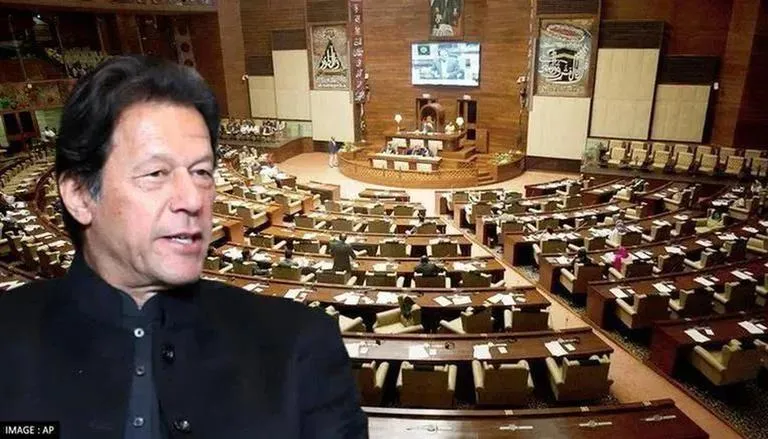After a series of twists and turns and a midnight session, the Pakistan National Assembly passed the no-confidence motion against Imran Khan in the wee hours of Sunday. The session conducted by Speaker Ayaz Sadiq, after former Speaker Asad Qaiser’s resignation, urged those in favour of the motion to move to the lobby on the left side to cast their vote.
As per the speaker, 174 MNAs recorded their vote in favour of the motion and against Imran Khan in the assembly. The majority mark required in the 342-member assembly was 172. With this, the motion was passed.
According to the details, Abdul Akbar Chitrali of Jamaat-e-Islami did not participate in the voting. Iqbal Muhammad Ali of MQM could not attend the meeting due to illness and Ayaz Sadiq could not cast his vote due to presiding over the session. Deviant members of the PTI were present in the opposition lobby during the proceedings, but did not participate in the voting. The Pakistan Parliament will elect its new leader on April 11.
Hectic political developments in Pakistan
The development follows high octane drama in the assembly and in Islamabad throughout the course of the day. The assembly session which was convened following a landmark Supreme Court order against the ruling PTI government, was set to vote on the no-trust motion at 10.30 AM, but members of the House were allowed to speak at great lengths with the speaker Asad Qaiser, adjourning the House at frequent intervals.
Ultimately, Qaiser refused to hold the no-trust vote against Imran Khan altogether, saying that he cannot ‘betray’ him, invoking the fury of the Opposition, which accused him of ‘contempt’. The speaker reportedly said that since he shares a 30-year relationship with the cricketer-turned-politician, “he cannot allow the voting to take place.”
“Whether contempt of court is declared or disqualified, I am ready to suffer the consequences, whatever punishment I may be given, but I cannot betray Imran,” Geo News quoted him as saying.
On the other hand, Imran Khan, who reportedly gave instructions to stall the session, called for a crucial meeting of the cabinet at 9 PM and addressed journalists thereafter asserting that he is not resigning from the post of the Pakistan PM. According to reports, he told the media that he is not running for the government but for a cause.
“No resignation, we are not running for Government but for a cause. Anything else will be decided depending upon the situation,” Imran has told media persons after the meeting. Earlier, reports had suggested that Pak PM and cabinet are going to resign after the meeting.
Ultimately, a seeming intervention was carried out by Army Chief General Qamar Javed Bajwa, Director-General of Inter-Services Intelligence (ISI) General Nadeem Anjum, and other senior military officials who reached the Prime Minister’s House to meet him.
Amid claims of his ‘life being in danger’, Khan’s Prime Ministerial security cover was stripped off and a session was called late at night where Speaker Asad Qaiser and Deputy Speaker of the National Assembly Qasim Suri were made to tender their resignation.
Notably, Pakistan was plunged into a political crisis after the assembly attempted to convene a session to vote on the no-trust motion on April 3, which was dismissed by the Deputy Speaker based on claims of ‘foreign conspiracy’. Ultimately, the SC after a 5-day marathon hearing, upheld that the Deputy Speaker’s April 3 ruling and the subsequent dissolution of the National Assembly was ‘unconstitutional’.

